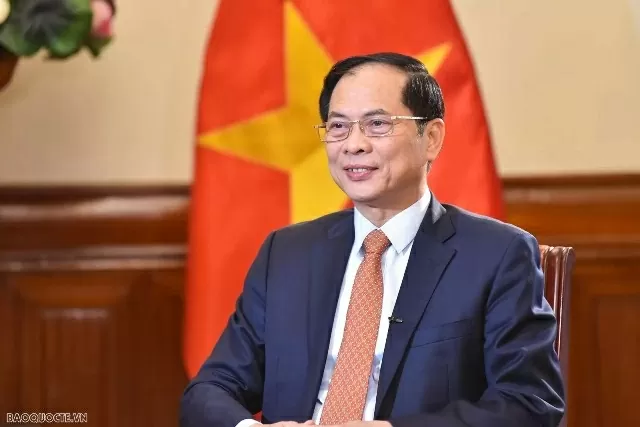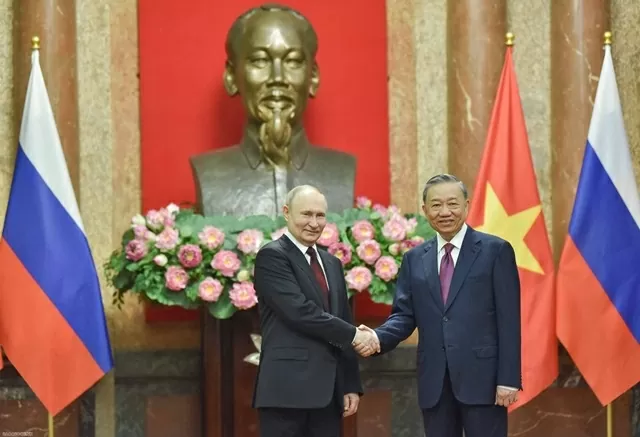
Deputy PM, FM Bui Thanh Son gives interview to Russian media on 75-year Vietnam–Russia relations
Latest
 |
| Deputy Prime Minister and Minister of Foreign Affairs Bui Thanh Son. (Photo: WVR) |
Answering a question about Vietnam’s lessons that have formed the country’s diplomacy policy today, Deputy Prime Minister Son pointed out four major ones.
First is the lesson of ensuring the highest national interests. Vietnam’s diplomacy has always imbued President Ho Chi Minh’s teaching: “Always serve the nation's interests.” Today, the national interest remains the compass guiding all actions, the most fundamental basis for determining Vietnam’s foreign policy and orientation, on the principles of equality, cooperation, mutual benefit, and in accordance with the United Nations Charter and international law.
Second is the lesson of combining national strength with the strength of the times. In the current period, diplomacy continues to play a pioneering role in mobilising favourable external conditions and resources, such as the trends of peace, cooperation, and development, the advancements of the Fourth Industrial Revolution, and emerging development trends such as digital transformation and green transition, to serve national development.
Third is the close coordination between foreign affairs and defence, security, and other sectors in both policy formulation and implementation. At present, Vietnam defines foreign affairs, together with defence, security and other domains, as playing a vital role in contributing to safeguarding the nation from early and from afar, firmly ensuring independence, sovereignty and territorial integrity, creating a peaceful, stable and favorable international environment, and harnessing resources and conditions for national development.
Fourth is the lesson of integration with the world, placing the country into the mainstream of the times, which today is about comprehensive, extensive, and effective international integration, making it a driving force for development and a shared undertaking of the entire political system and the people.
These invaluable historical lessons continue to shape Vietnam’s foreign policy in the new era, adapting to the evolving international context and helping Vietnam further affirm and elevate its position in the international arena, Deputy Prime Minister Son said.
Regarding the question that the US-China tensions are posing challenges to security and stability in the Asia-Pacific region while Vietnam is being assessed by the international community as one of the countries with a particularly important role in the regional security structure, Deputy Prime Minister Son shared principles and policy adjustments that help Vietnam maintain the balance between major power centres in the current complex context.
The Deputy Prime Minister said Vietnam's consistent and overarching foreign policy is firmly anchored in the principles of independence, self-reliance, diversification and multilateralisation of external relations. Vietnam strives to be a friend, a reliable partner, and a responsible member of the international community, actively and proactively pursuing comprehensive and extensive international integration.
The fundamental principle and motto guiding Vietnam’s foreign affairs is to safeguard the highest national interests in accordance with the UN Charter and international law, to resolutely and persistently defend independence, sovereignty, unity, and territorial integrity, and to apply the principle of “being firm in policy yet flexible in execution” to maintain peace, stability, and serve the cause of building and defending the country.
At the same time, Vietnam adheres to the “Four No’s” defence policy: no military alliances, no alignment with one country against another, no foreign military bases or use of Vietnamese territory to oppose other countries, and no use or threat of force in international relations.
On that basis, despite fluctuations in the current international and regional environment, Vietnam is cultivating a broadly open foreign policy landscape. Vietnam has established diplomatic relations with 194 countries, is an active member of over 70 international organisations and multilateral forums, and developed a network of strategic and comprehensive partnerships with 34 countries. Vietnam fosters friendly, practical, and effective cooperation with major powers, notably having strategic partnerships or higher with all non-permanent members of the UN Security Council. Furthermore, Vietnam is increasingly contributing actively and responsibly to addressing global issues and shared concerns within the international and regional communities, while promoting ASEAN’s centrality in the regional architecture.
Asked about the significance of the Russia’s victory on May 9, 1945, Deputy Prime Minister Son called it a great historical milestone not only for the people of the former Soviet Union and Russia today, but also for all peace-loving people and for revolutionary and national liberation movements around the world.
This date commemorates the Soviet Red Army’s decisive victory over fascism, which significantly weakened the colonial systems of European empires and marked the end of the most devastating war in human history—World War II—on the European front.
The Soviet Union’s victory in the Great Patriotic War in 1945, offered a tremendous source of encouragement for movements for national independence, democracy, and social progress around the world, especially in Asia, Africa, and Latin America, including Vietnam, he said.
This great victory also laid the foundation for today’s multilateral world order. It triggered a profound shift in the global political landscape, most notably the establishment of the United Nations, based on core principles of international relations such as respect for sovereign equality, the right of self-determination, and the peaceful resolution of disputes. These developments played a vital role in shaping the post-war global order and the future of humanity in favour of the rights and interests of all peoples.
May 9 is a day of triumph for justice and righteousness and also a day of remembrance, gratitude, and deep reverence for those who sacrificed their lives for independence, freedom, and peace.
At the 80th anniversary of Victory Day, people are reminded more than ever of the historical values, indomitable fighting spirit, and enduring aspiration for peace that this victory symbolizes. The triumph of the Soviet Red Army and progressive, peace-loving forces around the world will forever be remembered and honored, Deputy Prime Minister Son said.
The Deputy Prime Minister said that on the occasion of General Secretary Lam’s official visit to Russia and attendance at the celebration of the 80th anniversary of the Victory in the Great Patriotic War, Vietnam wishes to express its respect and honour for the enormous contributions and sacrifices of the former Soviet Union —and of the Russian Federation today— in securing the victory over fascism and steadfastly safeguarding world peace.
During the interview, Deputy Prime Minister Son pointed out key principles that help Vietnam and Russia maintain and promote the framework of Comprehensive Strategic Partnership throughout history and in the current period.
He said 75 years ago, Vietnam and the Soviet Union established diplomatic relations, laying a solid foundation for bilateral relations in all areas of bilateral cooperation and at international and regional forums.
The Party, State and people of Vietnam always remember the enormous and wholehearted support of the Soviet Union throughout the struggle for national independence and national construction. Such assistance over many decades has been an important factor contributing to the success of the cause of national liberation, reunification, construction and defence of Vietnamese people.
The Deputy Prime Minister emphasised that the Vietnam - Russia relationship today has continued to inherit and continue the good, close traditional friendship and cooperation between Vietnam and the former Soviet Union.
In 1994, the Treaty on the Principles of Friendly Relations between the two countries was signed, laying the foundation for the continuous strengthening and development of the Vietnam–Russia friendship and cooperation.
The year 2012 marked a milestone with the establishment of a Comprehensive Strategic Partnership between the two countries.
With the fundamental, core principles and long history of bilateral relations, together with the joint efforts of the two countries, this year marks the 75-year journey of Vietnam and Russia together building cooperative relations in all fields, in accordance with the interests of the two countries.
Deputy Prime Minister Son highlighted coopration progress in politics, diplomacy, defence, and security, with bilateral trade in 2024 reaching 4.58 billion USD. Russia currently has 199 investment projects in Vietnam with a total registered capital of 990 million USD. Meanwhile, Vietnam has 16 investment projects in Russia, worth 1.6 billion USD, ranking 4th among the 81 countries and territories where Vietnam has investments.
He also noted collaboration results in education-training and science-technology, and exchanges between localities. In education and training, the former Soviet Union trained nearly 40,000 Vietnamese professionals and experts across various fields. Today, Russia continues to support Vietnam in human resource development, with over 5,000 Vietnamese students currently studying in Russia.
Cooperation in science and technology also continues. The two countries have implemented joint research and technology transfer projects. Scientific collaboration under the Tropical Center in Vietnam has yielded many positive outcomes. Additionally, both sides are working on the establishment of a Center for Nuclear Science and Technology Research.
Local cooperation has been strengthened, with around 20 sister-city relationships established between Vietnamese and Russian localities—particularly between Hanoi, Ho Chi Minh City and Moscow, Saint Petersburg.
Notably, the Vietnamese community in Russia, numbering approximately 80,000 people, has made and continues to make significant contributions to the development of both countries and to bilateral relations.
The two countries have coordinated closely at multilateral forums and international organisations such as the United Nations, the Asia-Pacific Economic Cooperation (APEC), the Asia–Europe Meeting (ASEM), and the ASEAN Regional Forum (ARF), among others.
On the potential of the new regional energy cooperation architecture between Vietnam and Russia, Deputy Prime Minister Sơn emphasized that energy is one of the strategic pillars of the Comprehensive Strategic Partnership between the two countries.
For many years, oil and gas cooperation between Vietnam and Russia has been effectively implemented in accordance with international law, making a positive contribution to peace, stability, cooperation, and development in the region and beyond. Russia remains a major energy partner of Vietnam, particularly in oil and gas projects.
The two joint ventures, Vietsovpetro and Rusvietpetro, have been operating efficiently in oil and gas exploration and production in both Vietnam and Russia. In recent years, the two countries have also made concrete progress in peaceful nuclear energy cooperation and have expanded collaboration into new energy sectors such as renewable energy and green transportation.
Vietnam actively participates in energy cooperation and energy security mechanisms under the frameworks of ASEAN, ASEAN+3, APEC, and others. With a foundation of long-standing, trusted, and traditional relations with Russia in the energy sector, Vietnam is ready to serve as a bridge for dialogue, exchange, and experience-sharing between Russia and other countries in this field.
At the same time, Vietnam seeks to learn from its partners—especially in high and emerging technologies—to build a strong foundation for promoting effective cooperation in the energy sector. This will help ensure energy security, promote Vietnam’s sustainable development, and contribute to peace, stability, and growth in the region and the world./.
Regarding the significance of General Secretary To Lam's trip to Russia, the Deputy Prime Minister said that this visit is also an opportunity for Vietnam to further strengthen political trust between the two countries and to outline orientations for elevating the traditional friendship and Comprehensive Strategic Partnership with Russia to new heights. Vietnam also seeks to reinforce cooperation between the Communist Party of Vietnam and major political parties in Russia.
 |
| President To Lam and Russian President Vladimir Putin during a state visit to Vietnam in June 2024. (Photo: Nguyen Hong) |
During the visit, General Secretary To Lam and the high-level Vietnamese delegation are expected to hold important meetings with Russian leaders, thereby generating fresh momentum for bilateral cooperation across a wide range of areas. These include traditional areas of cooperation and emerging, high-potential fields such as economics, trade, investment, fundamental science, energy, high technology, and artificial intelligence. The visit will provide important impetus for realizing strategic development goals in the Vietnam–Russia relationship—for the benefit of both peoples, and for peace, stability, cooperation, and development in the region and the world.









